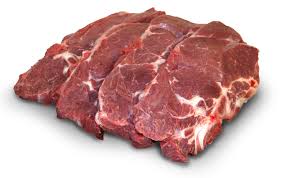记忆方法
将“beef”与“be”和“flesh”结合记忆。想象牛肉是“be”人身上的“flesh”(肉),这样可以帮助你记住“beef”是指牛肉这个概念。
以上内容由AI生成, 仅供参考和借鉴
中文词源
beef 牛肉
词源同bovine, 牛的。
英语词源
- beef
-
beef: [13] Like mutton, pork, and veal, beef was introduced by the Normans to provide a dainty alternative to the bare animal names ox, cow, etc when referring to their meat. Anglo-Norman and Old French boef or buef (which of course became modern French boeuf) came from Latin bov-, the stem of bōs ‘ox’, from which English gets bovine [19] and Bovril [19]. Bōs itself is actually related etymologically to cow. The compound beefeater ‘yeoman warder of the Tower of London’ was coined in the 17th century; it was originally a contemptuous term for a ‘well-fed servant’.
=> bovine, cow - beef (n.)
- c. 1300, from Old French buef "ox; beef; ox hide" (11c., Modern French boeuf), from Latin bovem (nominative bos, genitive bovis) "ox, cow," from PIE root *gwou- "cow, ox, bull" (see cow (n.)). Original plural was beeves.
- beef (v.)
- "to complain," slang, 1888, American English, from noun meaning "complaint" (1880s). The noun meaning "argument" is recorded from 1930s. The origin and signification are unclear; perhaps it traces to the common late 19c. complaint of U.S. soldiers about the quantity or quality of beef rations.
权威例句
- 1. They used to buy ten kilos of beef in one lump.
- 他们过去常买10公斤重的整块牛肉。
- 2. A tantalising aroma of roast beef fills the air.
- 空气中充满诱人的烤牛肉香味。
- 3. Beef now costs well over 30 roubles a pound.
- 牛肉现在卖到了每磅30多卢布。
- 4. They bought so much beef that some went bad.
- 他们买了太多牛肉,有些都变质了。
- 5. Some of the commercially produced venison resembles beef in flavour.
- 有些商业化养殖的鹿肉味道和牛肉很相似。

